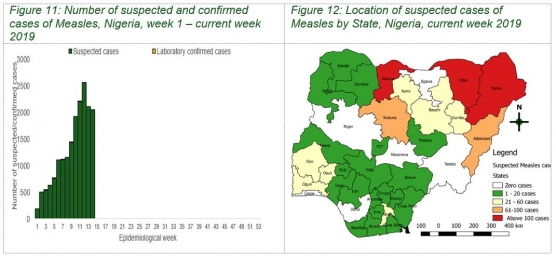The Nigeria Centre for Disease Control (NCDC) prioritises public workforce development through diverse strategies. We are working towards achieving the global goal of one trained field epidemiologist (or its equivalent) to 200,000 populations. Such strategies include various levels of the Nigeria Field Epidemiology and Laboratory Training Programme (FELTP) and more recently, internship programmes.
The NCDC’s post graduate internship programme is targeted at graduates with a background in health sciences, as well as a stream for Community Medicine Senior Registrars. The goal is to equip these public health trainees with practical exposures in public health, especially in field epidemiology aspects of outbreak response.
We are pleased to have recently completed a 10-week pilot internship programme for the first cohort of Community Medicine Senior Registrars in NCDC, which started on the 4th of February, 2019. The registrars are currently studying in three tertiary teaching hospitals in Nigeria. The programme provided the trainees a unique opportunity to gain competencies in areas such as incident management system, field investigation in response to outbreaks; emergency risk assessment; antimicrobial resistance; simulation exercises; leadership and diplomacy in public health; scientific writing etc. All trainees were part of field activities and acted as Incident Managers at the Emergency Operations Centre. One trainee said ‘I always thought it was easy to lead a meeting, Now I know better- we need to learn these soft skills to become leaders’.
Given the success of this first cohort, the NCDC is committed to working with tertiary institutions in Nigeria, to raise a strong workforce for our health security. More information on this can be found on the NCDC website via https://ncdc.gov.ng/internship.
Summary of Incidents
* Ongoing Incidents are defined as confirmed cases where a national EOC or equivalent has been activated (EOC is currently activated for Lassa fever, Cerebrospinal meningitis and Measles)
Other incidents are those confirmed cases for which EOC is not activated
Notes
1. Information for this disease was retrieved from the Technical Working Group and Situation Reports
2. Case Fatality Rate (CFR) for this disease is reported for confirmed cases only
3. Information for this disease was retrieved from IDSR 002 data
4. CFR for this disease is reported for total cases i.e. suspected + confirmed
5. Information for sentinel influenza was retrieved from the laboratory

Lassa Fever
Key Points
In the reporting week 14, no new health care worker was affected. A total of 17 health care workers have been infected since the onset of the outbreak in seven states – Edo (7), Ondo (3), Ebonyi (2), Enugu (1), Rivers (1), Bauchi (1) Benue (1) and Plateau (1) with two deaths in Enugu and Edo States
Actions
To date:
• Multi sectoral one health national rapid response teams deployed to Taraba and Bauchi states
• National Lassa fever Emergency Operations Centre (EOC) continues to coordinate the response activities at all levels

Cerebrospinal Meningitis (CSM)
Key Points
Actions
To date:
• The CSM National Emergency Operations Centre (EOC) is on response mode and meets weekly to review the situation
• Training on CSF collection and enhanced surveillance for clinicians and surveillance officers held in Niger State
Planned:
• World Meningitis Day commemoration to take place on 24th April, 2019

Yellow Fever
Key Points
Actions
To date:
• A multiagency Yellow fever TWG is coordinating response activities
• ICG request for reactive vaccination campaigns has been approved for Edo (5 LGAs), Ondo (7 LGAs) and Delta States (1 LGA)
Planned:
• A 2019 Preventive mass vaccination campaign is to take place in the last quarter of the year in Katsina, Edo, Ekiti and Rivers States

Cholera
Key Points
Actions
To date:
• NCDC has disseminated cholera alert mails and line list template to all states in preparedness for dry season transmission
• National Preparedness and Response to Acute Watery Diarrhoea/Cholera Guidelines. Available via
http://ncdc.gov.ng/themes/common/docs/protocols/45_1507196550.pdf

Measles
Key Points
Actions
To date:
• A National Measles Emergency Operational Centre (EOC) continues to coordinate response activities weekly
Planned:
• Closely monitor the reported outbreaks in a few States
• Establish sentinel sites for congenital rubella syndrome surveillance

Acute Flaccid Paralysis (AFP)
Key Points
• The last reported case of polio in Nigeria was in August 2016
• As at 7th April 2019, no new case of WPV was recorded
Actions
To date:
• Active case search for AFP is being intensified with the goal to eliminate polio in Nigeria
Planned:
• Intensify active AFP case search and continue to monitor progress being made to eliminate polio in Nigeria

National Influenza Sentinel Surveillance
Key Points
• The predominant Influenza A subtype so far this year is A seasonal H3 15(78.9%).
• The predominant Influenza B subtype so far this year is B (not subtyped) 2(100%).











 Toll Free Number: 6232
Toll Free Number: 6232 Whatsapp: +234 708 711 0839
Whatsapp: +234 708 711 0839 SMS Number: +234 809 955 5577
SMS Number: +234 809 955 5577 